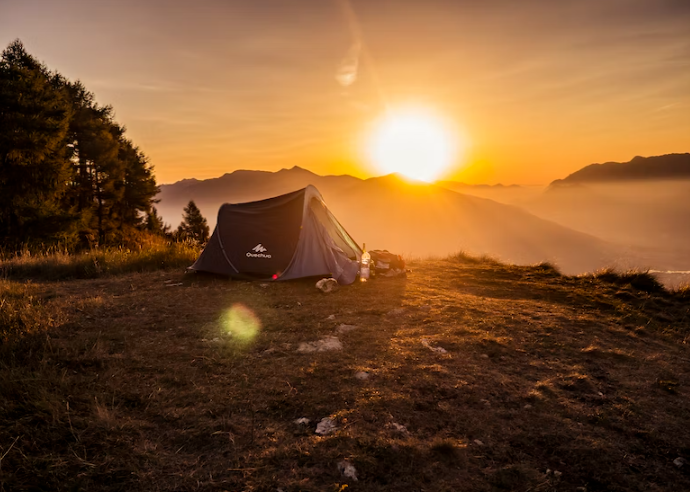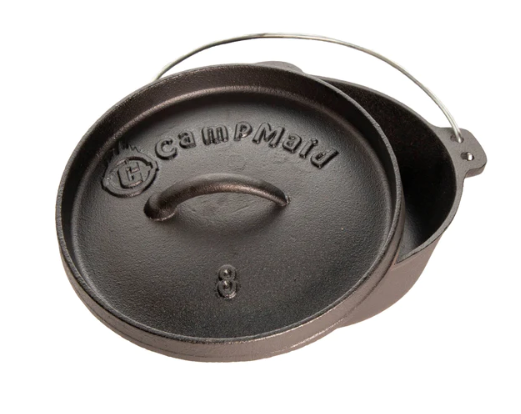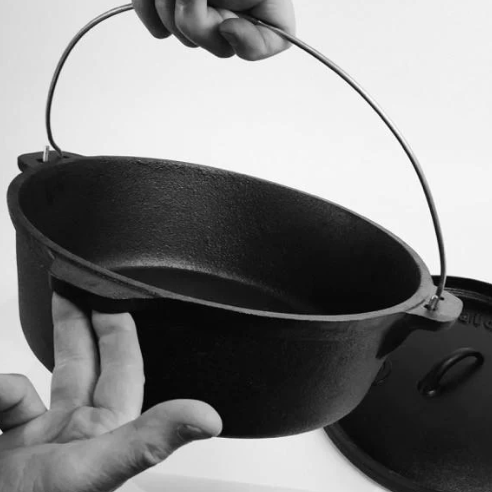
Your Complete Guide To Cooking Veggies While Camping
Vegetables are easy to cook both on or in a campfire—the key to getting the perfectly cooked vegetables are coverage and timing. Depending on what you’re cooking for your campsite meal, you’re going to have to put the veggies on the fire before the chicken, fish, steak, or any other meat.
Vegetables such as carrots, brussels sprouts, potatoes, and corn on the cob take a long time to cook, while others such as broccoli or onion need less time on the fire. Peas, mushrooms, zucchini, and other soft vegetables require the least amount of time. Due to the difference in cooking times, it’s important to separate your veggies and meat when cooking over a campfire.
Prep your veggies
You shouldn’t wait till the last moment to slice your veggies up and get them ready for the campfire. Julienne, dice, slice, or shop your veggies beforehand, and even take your preparation a step further to create some well-seasoned foil pouches and put them in the cooler. Make sure to take them out around an hour before cooking so that they reach room temperature and cook in a more uniform manner.
Use a bed of coals
You’ll need to have a fire that can burn long enough to make a hot bed of coals for this method. this is one of the best conditions to cook your food in, since the heat is more consistent, and the fire isn’t raging out of control. Keep stirring up the coals to even the heat out, wrap your veggies in foil, and place them straight onto the coals.
Don’t bury the little metal pouch of veggies since it can get too hot to touch, and you might not even find it if it’s too dark. This method is great for potatoes and carrots.
Top veggies
Here’s how you can cook some of these top favorites while you’re camping:
Carrots
Carrots aren’t the trickiest vegetable to cook, but they take much longer than you’d expect. Cut your carrots into slices and flavor them with a little bit of salt, pepper, and oil. Take care when selecting its seasonings and herbs since they’re already quite flavorful on their own.
Potatoes
Potatoes can take more than 90 minutes to be properly done. If you’re sure you want to bake a whole potato, prick it all over and rub on some salt and oil before wrapping it in foil. Rest the little ball on the embers and wait for it to soften. You can also dice or slice it to ensure faster cooking and add flavor with some oil-based salad dressing, or butter if you’re using a slow-cooking method.
Brussels sprouts
Brussels sprouts need to be exposed to be properly cooked—cut the ends off and slice the sprouts in half before placing the pieces on some foil and cooking them over a grate for around 30 minutes. You can also roast them in a Dutch oven with some onion, garlic, salt, pepper, and oil. A sweet balsamic vinaigrette can also bring out their delicious flavor.

Get a cast Dutch oven for more versatility while cooking
Cast iron Dutch ovens are the perfect pot to cook anything! Its thick base and walls ensure slow and even cooking, meaning that your food will be perfectly cooked on the inside without getting burned. They’re perfect for retaining heat and making slow-cooking recipes such as hearty stews with some delicious vegetables.
Take a look at CampMaid’s cast iron dutch oven set! Our wide assortment of high-quality Camp Kitchen Equipment is the perfect choice for cooking some yummy veggies in the great outdoors.
Contact us for more details about our outdoor cooking essentials.
Also in News
Vegetables are easy to cook both on or in a campfire—the key to getting the perfectly cooked vegetables are coverage and timing. Depending on what you’re cooking for your campsite meal, you’re going to have to put the veggies on the fire before the chicken, fish, steak, or any other meat.
Vegetables such as carrots, brussels sprouts, potatoes, and corn on the cob take a long time to cook, while others such as broccoli or onion need less time on the fire. Peas, mushrooms, zucchini, and other soft vegetables require the least amount of time. Due to the difference in cooking times, it’s important to separate your veggies and meat when cooking over a campfire.
Prep your veggies
You shouldn’t wait till the last moment to slice your veggies up and get them ready for the campfire. Julienne, dice, slice, or shop your veggies beforehand, and even take your preparation a step further to create some well-seasoned foil pouches and put them in the cooler. Make sure to take them out around an hour before cooking so that they reach room temperature and cook in a more uniform manner.
Use a bed of coals
You’ll need to have a fire that can burn long enough to make a hot bed of coals for this method. this is one of the best conditions to cook your food in, since the heat is more consistent, and the fire isn’t raging out of control. Keep stirring up the coals to even the heat out, wrap your veggies in foil, and place them straight onto the coals.
Don’t bury the little metal pouch of veggies since it can get too hot to touch, and you might not even find it if it’s too dark. This method is great for potatoes and carrots.
Top veggies
Here’s how you can cook some of these top favorites while you’re camping:
Carrots
Carrots aren’t the trickiest vegetable to cook, but they take much longer than you’d expect. Cut your carrots into slices and flavor them with a little bit of salt, pepper, and oil. Take care when selecting its seasonings and herbs since they’re already quite flavorful on their own.
Potatoes
Potatoes can take more than 90 minutes to be properly done. If you’re sure you want to bake a whole potato, prick it all over and rub on some salt and oil before wrapping it in foil. Rest the little ball on the embers and wait for it to soften. You can also dice or slice it to ensure faster cooking and add flavor with some oil-based salad dressing, or butter if you’re using a slow-cooking method.
Brussels sprouts
Brussels sprouts need to be exposed to be properly cooked—cut the ends off and slice the sprouts in half before placing the pieces on some foil and cooking them over a grate for around 30 minutes. You can also roast them in a Dutch oven with some onion, garlic, salt, pepper, and oil. A sweet balsamic vinaigrette can also bring out their delicious flavor.

Get a cast Dutch oven for more versatility while cooking
Cast iron Dutch ovens are the perfect pot to cook anything! Its thick base and walls ensure slow and even cooking, meaning that your food will be perfectly cooked on the inside without getting burned. They’re perfect for retaining heat and making slow-cooking recipes such as hearty stews with some delicious vegetables.
Take a look at CampMaid’s cast iron dutch oven set! Our wide assortment of high-quality Camp Kitchen Equipment is the perfect choice for cooking some yummy veggies in the great outdoors.
Contact us for more details about our outdoor cooking essentials.

4 Sustainable Camping Gear Essentials
Are you a camping enthusiast? Here are four sustainable camping gear essentials that you should consider investing in.
Vegetables are easy to cook both on or in a campfire—the key to getting the perfectly cooked vegetables are coverage and timing. Depending on what you’re cooking for your campsite meal, you’re going to have to put the veggies on the fire before the chicken, fish, steak, or any other meat.
Vegetables such as carrots, brussels sprouts, potatoes, and corn on the cob take a long time to cook, while others such as broccoli or onion need less time on the fire. Peas, mushrooms, zucchini, and other soft vegetables require the least amount of time. Due to the difference in cooking times, it’s important to separate your veggies and meat when cooking over a campfire.
Prep your veggies
You shouldn’t wait till the last moment to slice your veggies up and get them ready for the campfire. Julienne, dice, slice, or shop your veggies beforehand, and even take your preparation a step further to create some well-seasoned foil pouches and put them in the cooler. Make sure to take them out around an hour before cooking so that they reach room temperature and cook in a more uniform manner.
Use a bed of coals
You’ll need to have a fire that can burn long enough to make a hot bed of coals for this method. this is one of the best conditions to cook your food in, since the heat is more consistent, and the fire isn’t raging out of control. Keep stirring up the coals to even the heat out, wrap your veggies in foil, and place them straight onto the coals.
Don’t bury the little metal pouch of veggies since it can get too hot to touch, and you might not even find it if it’s too dark. This method is great for potatoes and carrots.
Top veggies
Here’s how you can cook some of these top favorites while you’re camping:
Carrots
Carrots aren’t the trickiest vegetable to cook, but they take much longer than you’d expect. Cut your carrots into slices and flavor them with a little bit of salt, pepper, and oil. Take care when selecting its seasonings and herbs since they’re already quite flavorful on their own.
Potatoes
Potatoes can take more than 90 minutes to be properly done. If you’re sure you want to bake a whole potato, prick it all over and rub on some salt and oil before wrapping it in foil. Rest the little ball on the embers and wait for it to soften. You can also dice or slice it to ensure faster cooking and add flavor with some oil-based salad dressing, or butter if you’re using a slow-cooking method.
Brussels sprouts
Brussels sprouts need to be exposed to be properly cooked—cut the ends off and slice the sprouts in half before placing the pieces on some foil and cooking them over a grate for around 30 minutes. You can also roast them in a Dutch oven with some onion, garlic, salt, pepper, and oil. A sweet balsamic vinaigrette can also bring out their delicious flavor.

Get a cast Dutch oven for more versatility while cooking
Cast iron Dutch ovens are the perfect pot to cook anything! Its thick base and walls ensure slow and even cooking, meaning that your food will be perfectly cooked on the inside without getting burned. They’re perfect for retaining heat and making slow-cooking recipes such as hearty stews with some delicious vegetables.
Take a look at CampMaid’s cast iron dutch oven set! Our wide assortment of high-quality Camp Kitchen Equipment is the perfect choice for cooking some yummy veggies in the great outdoors.
Contact us for more details about our outdoor cooking essentials.

Choose the Best Dutch Oven: 3 Features to Consider
Are you looking for the best Dutch oven sets online? Here are three features that you should consider when buying one.
Vegetables are easy to cook both on or in a campfire—the key to getting the perfectly cooked vegetables are coverage and timing. Depending on what you’re cooking for your campsite meal, you’re going to have to put the veggies on the fire before the chicken, fish, steak, or any other meat.
Vegetables such as carrots, brussels sprouts, potatoes, and corn on the cob take a long time to cook, while others such as broccoli or onion need less time on the fire. Peas, mushrooms, zucchini, and other soft vegetables require the least amount of time. Due to the difference in cooking times, it’s important to separate your veggies and meat when cooking over a campfire.
Prep your veggies
You shouldn’t wait till the last moment to slice your veggies up and get them ready for the campfire. Julienne, dice, slice, or shop your veggies beforehand, and even take your preparation a step further to create some well-seasoned foil pouches and put them in the cooler. Make sure to take them out around an hour before cooking so that they reach room temperature and cook in a more uniform manner.
Use a bed of coals
You’ll need to have a fire that can burn long enough to make a hot bed of coals for this method. this is one of the best conditions to cook your food in, since the heat is more consistent, and the fire isn’t raging out of control. Keep stirring up the coals to even the heat out, wrap your veggies in foil, and place them straight onto the coals.
Don’t bury the little metal pouch of veggies since it can get too hot to touch, and you might not even find it if it’s too dark. This method is great for potatoes and carrots.
Top veggies
Here’s how you can cook some of these top favorites while you’re camping:
Carrots
Carrots aren’t the trickiest vegetable to cook, but they take much longer than you’d expect. Cut your carrots into slices and flavor them with a little bit of salt, pepper, and oil. Take care when selecting its seasonings and herbs since they’re already quite flavorful on their own.
Potatoes
Potatoes can take more than 90 minutes to be properly done. If you’re sure you want to bake a whole potato, prick it all over and rub on some salt and oil before wrapping it in foil. Rest the little ball on the embers and wait for it to soften. You can also dice or slice it to ensure faster cooking and add flavor with some oil-based salad dressing, or butter if you’re using a slow-cooking method.
Brussels sprouts
Brussels sprouts need to be exposed to be properly cooked—cut the ends off and slice the sprouts in half before placing the pieces on some foil and cooking them over a grate for around 30 minutes. You can also roast them in a Dutch oven with some onion, garlic, salt, pepper, and oil. A sweet balsamic vinaigrette can also bring out their delicious flavor.

Get a cast Dutch oven for more versatility while cooking
Cast iron Dutch ovens are the perfect pot to cook anything! Its thick base and walls ensure slow and even cooking, meaning that your food will be perfectly cooked on the inside without getting burned. They’re perfect for retaining heat and making slow-cooking recipes such as hearty stews with some delicious vegetables.
Take a look at CampMaid’s cast iron dutch oven set! Our wide assortment of high-quality Camp Kitchen Equipment is the perfect choice for cooking some yummy veggies in the great outdoors.
Contact us for more details about our outdoor cooking essentials.

How to Cook with a Dutch Oven while Camping
Are you taking CampMaid’s Dutch oven on your next camping trip? Here’s how you can cook on it.
